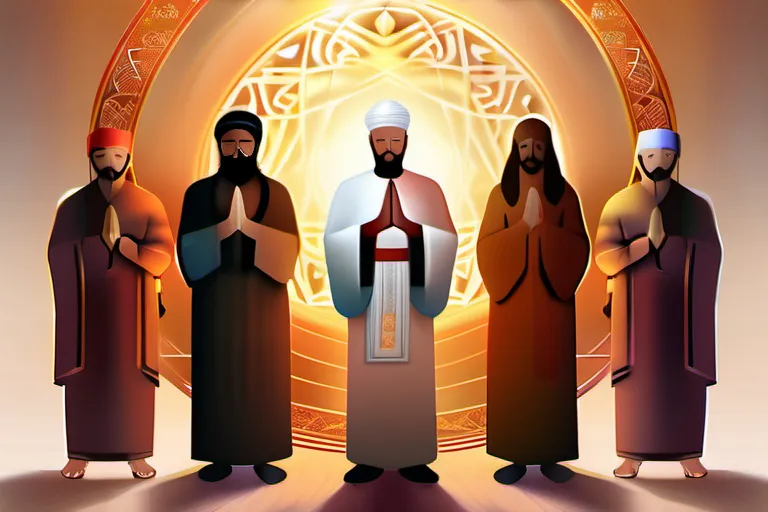Explore the fundamental ideas that unite various religions, their impact on society, and the quest for a universal faith.
This article delves into the concept of universalizing religion, examining the main ideas that bind diverse religious traditions together. We will explore how these concepts have evolved over time, their significance in shaping societies, and the ongoing quest for a unified global faith.
The Quest for a Universal Faith: A Historical Overview
The quest for a universal faith has been a perennial human endeavor, much like searching for the Holy Grail in medieval legends. These ancient quests reflect our innate desire to find common ground and unity amidst the diverse religious landscapes that have shaped human societies over millennia. From the early philosophies of Plato and Aristotle, which laid down some of the foundational ideas about the nature of reality and morality, to the modern-day movements like Unitarian Universalism and the New Age movement, one can trace a continuous thread of seeking a universal truth.
Plato’s notion of Forms or Ideas , which suggested that there is an eternal and unchanging world of perfect ideals beyond our physical reality, hints at a universal understanding of existence. This concept has resonated through various traditions, from Pythagoreanism to later philosophical movements in the Western world.
In the East, Buddhist philosophy, with its emphasis on compassion (karuṇā) and wisdom (prajñā), offers another perspective. The idea that all beings can achieve enlightenment and end suffering speaks to a universal human potential for spiritual growth and understanding. This is reflected in various interpretations across different schools of Buddhism.
The prophetic religions, such as Judaism, Christianity, and Islam, have also contributed significantly to the quest for a universal faith through their messianic visions and teachings about unity and brotherhood among all people. The concept of Dharmic traditions like Hinduism and Jainism, with their emphasis on dharma (duty) and ahimsa (non-violence), also offer insights into living in harmony and seeking universal truths.
Today, the idea of a universal faith is not just an academic or philosophical curiosity. It is a lived experience for many who seek to integrate diverse religious teachings and practices into their personal and communal lives. This quest for unity continues to evolve, driven by global interconnectedness and the shared challenges faced by humanity.
As we explore these key concepts in universalizing religion, it becomes clear that our search for a common ground is not merely an intellectual exercise but a profound journey of self-discovery and mutual understanding.
Key Concepts in Universalizing Religion: An In-depth Analysis
Imagine a world where every soul, regardless of their background, could find a common thread woven through the fabric of existence—this is the essence of universalizing religion. But what are the key concepts that bind these diverse faiths together? Let’s delve into this intriguing question by exploring love, compassion, and the pursuit of truth.
Love in its various forms often serves as a unifying force across different religious traditions. Could it be that the Agape of Christianity, the Mahatma of Buddhism, or the Ishvara Bhakti of Hinduism are all manifestations of the same profound emotion? This question invites us to ponder how love can transcend cultural and religious boundaries, bringing people closer together.
Compassion, too, is a powerful concept that resonates deeply within universalizing religions. Could it be that the teachings of Gandhi, who espoused non-violence and compassion as his guiding principles, mirror those found in the Sermon on the Mount? This idea challenges us to consider how acts of kindness and empathy can forge a universal language of humanity.
The pursuit of truth is another central theme that spans various religious traditions. Philosophers like Socrates in ancient Greece and later thinkers in various faiths have sought understanding and wisdom, often through dialogue and inquiry. Could the quest for knowledge and enlightenment be seen as a shared journey across different belief systems? This question prompts us to reflect on how the desire for truth can unite people despite their differences.
These concepts are more than just abstract ideas; they represent the very essence of what it means to seek unity in diversity. By examining love, compassion, and the pursuit of truth, we gain a deeper understanding of why universalizing religions continue to captivate humanity’s imagination and inspire societal change.
The Role of Universalizing Religion in Shaping Societies
How does universalizing religion shape our societies? It’s a question that has puzzled thinkers and scholars for centuries. Imagine if every society had a blueprint to follow, guiding everything from personal ethics to international relations. That’s what universalizing religion offers—it provides a set of principles that transcend cultural barriers and historical contexts.
Through the lens of history, we can see how these religions have influenced societal structures in profound ways. Take the example of monotheism, which has been pivotal in shaping legal systems, educational frameworks, and even economic policies across different regions. Can you imagine a world where every community adheres to the same moral standards and values? This is not just a utopian dream but a reality for many who follow these religions.
Moreover, universalizing religion has played a crucial role in cultural norms. Think about how festivals, traditions, and even daily practices are intertwined with religious beliefs. From the Islamic festival of Eid to the Christian celebration of Christmas, these events not only mark the calendar but also reinforce communal bonds and identities. It’s like weaving together threads from different cultures into one rich tapestry.
But beyond cultural norms, universalizing religion has also impacted global interactions. During times of conflict or peace, religious leaders often serve as mediators, promoting understanding and cooperation between nations. In a world where globalization is ever-present, these interfaith dialogues become even more critical for fostering mutual respect and building bridges across continents.
In essence, universalizing religion acts like a beacon, guiding us toward a unified vision of humanity. It’s not just about following a set of rules but embracing a shared humanity that transcends our differences. As we navigate the complexities of modern society, these religions offer a path towards a more harmonious and interconnected world.
Universalizing Religion and Interfaith Dialogue: A Modern Perspective
How do we bridge the divides between different religions? Can universalizing religion play a pivotal role in fostering interfaith dialogue and mutual respect? These questions have echoed through history as people seek to understand each other’s beliefs and practices. Universalizing religions, such as Christianity, Islam, and Buddhism, often emphasize principles that can be applied universally, transcending cultural boundaries.
Imagine the world as a vast garden where different faiths are like distinct flowers, each with its unique beauty but sharing the same soil of humanity. Just as these flowers need to coexist harmoniously for the garden’s splendor, so too do religions need to engage in meaningful dialogue and respect one another’s contributions.
Interfaith dialogue is not just about exchanging ideas; it’s a journey towards mutual understanding. By engaging in respectful conversation, adherents of different faiths can learn from each other’s strengths and perhaps find common ground on issues like compassion, justice, and peace. This exchange fosters an environment where diversity is celebrated rather than seen as a source of conflict.
The role of universalizing religion here cannot be understated. These religions often promote core values that can unite people across different backgrounds—values such as love, forgiveness, and respect for human dignity. By emphasizing these shared principles, they pave the way for dialogue and cooperation in addressing global challenges like poverty, conflict, and environmental degradation.
However, achieving this vision of a harmonious world requires effort and commitment from all parties involved. It involves listening to others with an open heart, respecting their beliefs, and finding ways to collaborate despite differences. This is not always easy; it demands patience, empathy, and a willingness to see the world through another’s eyes.
As we move forward in our quest for a more unified understanding of faith, let us remember that each step towards interfaith dialogue brings us closer to a more peaceful and harmonious society. The path may be challenging, but with dedication and a shared commitment to respect and understanding, we can make progress together.
Challenges and Opportunities in Achieving a Universal Faith
Challenges and Opportunities in Achieving a Universal Faith: Can we bridge the gap between diverse belief systems to create a unified religious framework? The quest for a universal faith has been a tantalizing yet elusive goal, akin to finding the mythical golden thread that connects all religions into one seamless fabric. But what are the obstacles standing in our way?
One significant challenge is the entrenched nature of traditional beliefs and practices. Each religion is like a deeply rooted tree with its own branches, roots, and leaves, resistant to change. How do we uproot such deep-seated ideologies without causing harm or division? It’s as if we’re trying to shift an entire mountain range – it requires immense effort and careful planning.
Another hurdle is the perceived exclusivity of many religions, which often claim a monopoly on truth. These beliefs are like closed clubs with rigid rules that newcomers find difficult to join. How can we open these doors without compromising their core values? It’s akin to inviting strangers into your home; you must be welcoming yet maintain the sanctity of your space.
However, there are also opportunities for growth and unity. Interfaith dialogues provide a platform where different faiths can exchange ideas and find common ground. These discussions are like the first tentative steps towards understanding, slowly breaking down barriers that have stood for centuries. By fostering mutual respect and cooperation, we can create a more inclusive world where diverse beliefs coexist harmoniously.
To overcome these challenges, we need innovative solutions. Perhaps technology can play a role, offering new ways to share knowledge and connect people across different religious landscapes. Globalization also presents an opportunity for cross-cultural exchange, potentially leading to a richer, more interconnected spiritual tapestry. But it’s crucial that we approach this with sensitivity and wisdom, ensuring that any changes respect the integrity of each tradition.
Ultimately, achieving a universal faith isn’t just about overcoming obstacles; it’s about embracing the diversity within us all. It’s like building a bridge that spans different rivers but retains its own unique design. The journey towards unity is long and complex, but every step forward brings us closer to a world where we can live together in peace and harmony, guided by our shared values of love, compassion, and understanding.
The Future of Universalizing Religion: Predictions and Possibilities
As we look towards the future, one can’t help but wonder how technological advancements, globalization, and cultural shifts will transform universalizing religion. Will these forces pave the way for a unified spiritual path, or will they create new divisions?
Technological innovations such as artificial intelligence and virtual reality could potentially offer immersive experiences that transcend physical barriers, bringing people closer to shared spiritual concepts. Imagine a world where AI can simulate divine encounters, making the experience of ‘becoming one with the universe’ accessible to everyone, regardless of geographical or cultural boundaries.
Globalization has already shrunk the world, connecting us in ways never before imagined. But how will this interconnectedness influence our religious beliefs? Will it lead to a blending of traditions and practices, fostering a more inclusive understanding of the divine? Or could it exacerbate existing tensions, as different cultures clash over their unique spiritual identities?
Cultural shifts towards pluralism and diversity are also playing a significant role. Younger generations are increasingly open to exploring multiple faiths and ideas, seeking a synthesis that reflects a globalized world. This openness might encourage the development of universalizing religions that draw from various sources, creating a rich tapestry of beliefs.
However, these possibilities come with their own set of challenges. For instance, as religious identities become more fluid, how will we maintain a sense of coherence and purpose within a diverse spiritual framework? Will new forms of religious expression emerge, or will traditional institutions adapt to stay relevant?
The future of universalizing religion is not just about overcoming the challenges of the present but also embracing the endless possibilities that lie ahead. It’s an exciting time where every technological leap, global event, and cultural trend could shape the very essence of our spiritual lives.
Conclusion
 By understanding the key concepts associated with universalizing religion, we can foster greater interfaith dialogue, promote mutual respect, and work towards a more harmonious world. This article serves as a valuable resource for anyone interested in religious studies, cultural anthropology, or sociology.
By understanding the key concepts associated with universalizing religion, we can foster greater interfaith dialogue, promote mutual respect, and work towards a more harmonious world. This article serves as a valuable resource for anyone interested in religious studies, cultural anthropology, or sociology.











